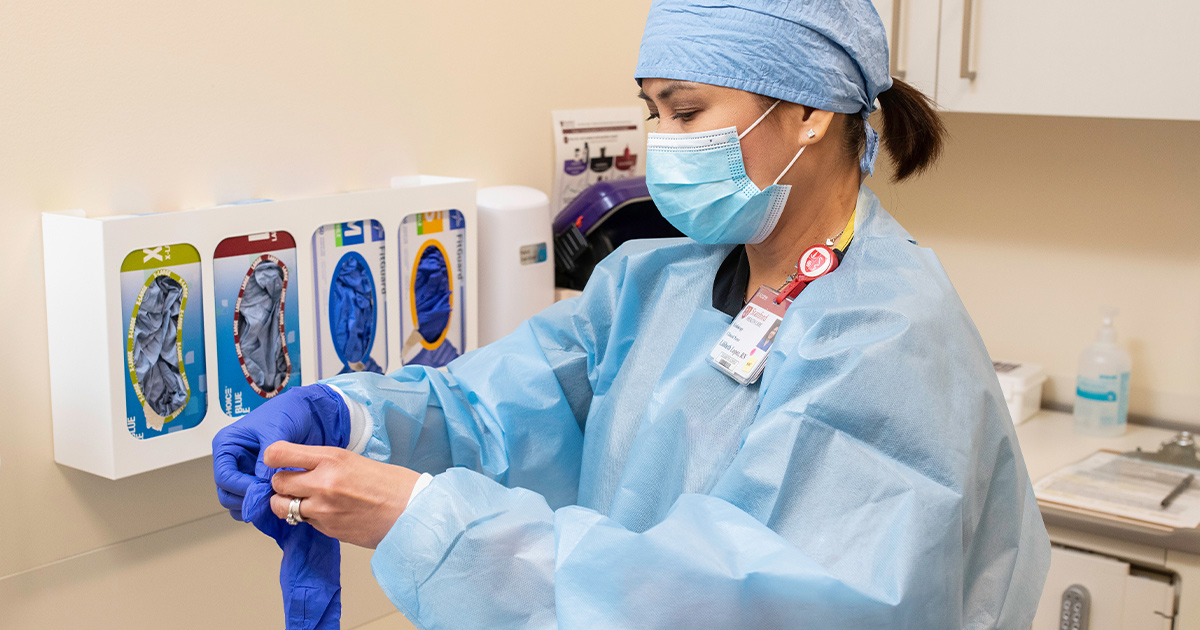Liver Clinic (Hepatology)
Part of Digestive Health Center

Leaders in Treating Complex and Common Liver Disorders
The Stanford Liver Clinic provides comprehensive care for all acute and chronic liver diseases, including hepatitis, fatty liver, cirrhosis, and cancer. Our clinic’s experts in hepatology, radiology, pathology, liver surgery, and other specialties collaborate closely to tailor a care plan to your specific needs.
What We Offer You for Liver Care
- Specialized expertise in detecting all forms of liver disease and providing exceptional care, even for conditions once thought untreatable. Go to Conditions Treated
- Advanced prevention and treatment strategies, including lifestyle and behavior modification, vaccination, medications, and surgery Go to Treatments
- Clinical trials studying the latest advances that may not be available yet elsewhere to help manage liver disorders. Go to Clinical Trials
- Team-based care that brings together hepatologists, radiologists, pathologists, surgeons, and other leading experts to tailor a plan to your needs. Go to Your Care Team
- Complete support services including nutrition counseling and an on-site pharmacy to help you focus on your total health and wellness. Go to Support Services
- Easy access to a broad range of liver and digestive health specialties and support services at one convenient location. Go to Accessing Care
Our doctors provide expert care for all types of liver disease, including fatty liver disease and hepatitis.
We offer in-depth experience diagnosing and treating all stages of liver disease, from inflammation and fibrosis to cirrhosis. Our team specializes in delivering compassionate, effective care, even for conditions once thought to be untreatable.
For complex cases, our team of hepatologists, surgeons, and other digestive health specialists meets weekly to pool their expertise and discuss the best approach to your treatment.
Should you require more advanced treatment, we partner closely with a number of sub-specialty clinics, including the Stanford Liver Transplant Program and the Stanford Gastrointestinal (GI) Cancer Program, to deliver the care you need.
New medical advances now allow us to reduce and even reverse cirrhosis.
Conditions
Cirrhosis
Our team has extensive experience diagnosing, treating, and monitoring all conditions, from routine to extremely challenging.
- Alcohol-induced fatty liver disease
- Alcoholic hepatitis
- Alcoholic cirrhosis
Autoimmune liver diseases
- Autoimmune hepatitis
- Primary biliary cholangitis
- Primary sclerosing cholangitis
- Hepatitis A
- Hepatitis B
- Hepatitis C
- Hepatitis D
- Hepatitis E
Inherited liver conditions
- Hemochromatosis
- Alpha-1 antitrypsin deficiency
- Wilson’s disease
Liver cancer (We work in partnership with the Stanford Gastrointestinal GI Cancer Program)
- Hepatocellular cancer
- Cholangiocarcinoma
- Benign liver tumors and other hepatic lesions
Nonalcoholic fatty liver disease
- Nonalcoholic fatty liver
- Nonalcoholic Steatohepatitis (NASH)
- Nonalcoholic steatohepatiitis with cirrhosis
Other liver conditions
- Drug-Induced Liver Disease / Drug-Induced Hepatitis
- Hepatomegaly
- Other rare types of liver disease
Cirrhosis is the final stage in Chronic Liver Disease where scar tissue slowly replaces normal functioning liver tissue. As tissue is lost, the liver can no longer effectively process nutrients, hormones, drugs, and poisons, nor can it efficiently produce proteins and other substances needed by the body.
It used to be thought that damage caused by cirrhosis was permanent. Our doctors now have the ability to slow and even reverse liver cirrhosis in almost all cases.
All of our Hepatologists are members of the Stanford Liver Transplant Program and if your cirrhosis is determined to be advanced, your Hepatologist will ensure you are evaluated to determine if liver transplantation is an appropriate treatment option.
All liver diseases, if untreated, have the potential to progress to cirrhosis. The most common are below:
- Alcoholic cirrhosis
- Chronic liver disease due to viral hepatitis B and C
- Cholangitis
- Nonalcoholic steatohepatitis with cirrhosis
- Autoimmune hepatitis
- Primary biliary cholangitis
- Primary sclerosing cholangitis
- Inherited liver diseases including: Hemochromatosis, Wilsons's disease, and Alpha-1-antitrypsin deficiency
Our team has extensive experience diagnosing, treating, and monitoring all conditions, from routine to extremely challenging.
- Alcohol-induced fatty liver disease
- Alcoholic hepatitis
- Alcoholic cirrhosis
Autoimmune liver diseases
- Autoimmune hepatitis
- Primary biliary cholangitis
- Primary sclerosing cholangitis
- Hepatitis A
- Hepatitis B
- Hepatitis C
- Hepatitis D
- Hepatitis E
Inherited liver conditions
- Hemochromatosis
- Alpha-1 antitrypsin deficiency
- Wilson’s disease
Liver cancer (We work in partnership with the Stanford Gastrointestinal GI Cancer Program)
- Hepatocellular cancer
- Cholangiocarcinoma
- Benign liver tumors and other hepatic lesions
Nonalcoholic fatty liver disease
- Nonalcoholic fatty liver
- Nonalcoholic Steatohepatitis (NASH)
- Nonalcoholic steatohepatiitis with cirrhosis
Other liver conditions
- Drug-Induced Liver Disease / Drug-Induced Hepatitis
- Hepatomegaly
- Other rare types of liver disease
close Conditions
Cirrhosis is the final stage in Chronic Liver Disease where scar tissue slowly replaces normal functioning liver tissue. As tissue is lost, the liver can no longer effectively process nutrients, hormones, drugs, and poisons, nor can it efficiently produce proteins and other substances needed by the body.
It used to be thought that damage caused by cirrhosis was permanent. Our doctors now have the ability to slow and even reverse liver cirrhosis in almost all cases.
All of our Hepatologists are members of the Stanford Liver Transplant Program and if your cirrhosis is determined to be advanced, your Hepatologist will ensure you are evaluated to determine if liver transplantation is an appropriate treatment option.
All liver diseases, if untreated, have the potential to progress to cirrhosis. The most common are below:
- Alcoholic cirrhosis
- Chronic liver disease due to viral hepatitis B and C
- Cholangitis
- Nonalcoholic steatohepatitis with cirrhosis
- Autoimmune hepatitis
- Primary biliary cholangitis
- Primary sclerosing cholangitis
- Inherited liver diseases including: Hemochromatosis, Wilsons's disease, and Alpha-1-antitrypsin deficiency
close Cirrhosis
Our doctors are leading academic researchers who apply the same innovative drive to the delivery of your care.
Working closely with colleagues and researchers across Stanford University, they help define the national standards of care for liver disease through ongoing research and participation in the Hepatitis B Research Network, the TRIO Network for Hepatitis B, and other leading medical associations.
Hepatitis C, the most common blood borne infection in the U.S., is now curable in almost all cases.
INNOVATION HIGHLIGHTs
- Our doctors helped develop new therapies for hepatitis C that can suppress a patient’s viral load to undetectable levels in just 8-12 weeks of treatment.
- Stanford researchers were instrumental in developing the Model for End-Stage Liver Disease (MELD), an internationally adopted scoring system for assessing the severity of chronic liver disease. This system is used to prioritize the allocation of organs for transplant.
All Treatments
Understanding your stage of liver disease is crucial to developing the best plan to treat, and in some cases, reverse liver damage.
We combine leading expertise with advanced tools to pinpoint the root cause of your symptoms. For example, using a state-of-the-art imaging system, known as elastography, we can analyze certain forms of liver damage, without performing a biopsy or surgery.
Our entire team works closely with you to develop a care plan tailored to your medical and lifestyle needs. Your plan may include one or a combination of the following therapies:
Prevention
Our first objective, whenever possible, to prevent further liver damage and disorders through three key steps:
- Lifestyle and behavior modification
- Medical weight loss
- Vaccination
Nutrition
We are one of the few centers in the country providing comprehensive nutrition care to patients with liver disease through our GI Nutrition Services.
Pain Management
We partner closely with the Gastrointestinal (GI) Pain Clinic to provide relief for liver disease.
Medication
- Anti-inflammatory medications
- Antiviral medication, for treating viral infections including hepatitis B and hepatitis C
- Immunosuppressive medications
Dialysis
Extracorporeal liver assist device (ELAD), technology that supports liver function outside the body
Minimally Invasive Endoscopy
Our Endoscopy Suite allows us to perform many minimally invasive treatments, avoiding the need for surgery.
Interventional Radiology
Minimally invasive procedures are performed in partnership with Interventinoal Radiology.
- Transjugular intrahepatic portosystemic shunt (TIPS)
Surgery
Surgery is performed in partnership with our Liver Transplant Program and Bariatric Surgery Clinic.
- Partial liver resection
- Liver transplant
- Bariatric surgery
Clinical Trials
Our specialists deepen the understanding of liver health care through research and clinical trials. These studies evaluate new medical techniques, medications, and devices to diagnose, treat, or prevent liver conditions
We offer multiple clinical trials for patients with a variety of chronic liver diseases including hepatitis B, hepatitis C, non-alcoholic fatty liver disease, alcoholic liver disease, hemochromatosis, primary biliary cholangitis, and primary sclerosing cholangitis.
As a Stanford Health Care patient, you have access to these exciting new approaches.
Your Care Team
Every day, our doctors collaborate with nurses, registered dietitians, and other health care professionals to develop and implement the most effective care plan for you.

Your Doctors
Hepatologists
Our hepatologists diagnose and treat conditions affecting the liver. Our hepatologists have extensive training and experience in treating all stages of liver disease.
View All {0} Hepatologists
Hepatobiliary Surgeons
Our hepatobiliary surgeons treat benign and malignant diseases of the liver, pancreas, bile duct, and gallbladder.
View All {0} Hepatobiliary SurgeonsLiver radiologists
Liver radiologists obtain images of the liver using x-rays, magnetic resonance imaging (MRI), CT scans, ultrasounds, and other technology.
Pathologists
Pathologists examine tissue samples taken through an endoscopy or a biopsy to determine the presence of a wide variety of diseases. A highly trained pathologist on our team views samples of liver tissue under a microscope to look for liver disease or monitor its stages.
Oncologists
Oncologists focus on the diagnosis and treatment of tumors and cancer. Our doctors work closely with the oncologists at the Stanford Gastrointestinal (GI) Cancer Program.
Transplant surgeons
When a liver transplant is needed, we work closely with the transplant surgeons at the Stanford Liver Transplant Program.
Bariatric surgeons
In cases of fatty liver disease, we work in partnership with bariatric surgeons at the Bariatric Surgery & Medical Weight Loss Clinic.
Nurse Practitioner
Nurse practitioners (NPs) are registered nurses (RNs) who have advanced education and clinical training. They can perform physical exams, diagnose and treat health problems, order lab work and X-rays, prescribe medicines, and provide health information.
View All {0} Nurse PractitionersPhysician Assistant
Physician assistants (PAs) are health professionals who practice medicine under a doctor's supervision in medical and surgical settings. They can perform routine exams, order lab work and X-rays, prescribe medicines, and counsel people about their health.
View All {0} Physician AssistantsStanford is an Academic Medical Center, which is a type of hospital setting where doctors teach the entire spectrum of medical education. Students range from beginning medical students to fully licensed and practicing doctors completing advanced sub-specialty training. Stanford Medicine is a partnership between Stanford University School of Medicine and Stanford Health Care. Since Stanford is a teaching hospital, you can expect to meet many providers and providers in training.
- Attending Physician: a doctor who supervises doctors in training or in medical school
- Fellow: a doctor doing postgraduate level work and specializing in care of patients with specific conditions
- Resident: a doctor who has graduated from medical school and is in training (also called “residency”) here at Stanford. A resident is also called an intern
- Medical Student: a student who is currently enrolled in medical school with the goal of becoming a doctor

Extended Care Team
The diet and nutrition experts working with the Liver Clinic have extensive training in the relationship between food choices and liver health.
DIETITIANS
Pharmacists working with our clinic are experienced experts in preparing and dispensing medications specifically for liver conditions.
Care coordinators provide you with information and assistance prior to and during your appointments. They help you navigate from your first contact with us to follow-up care, assessing your needs, answering your questions, making referrals, coordinating appointments, and providing education.
- Medical Assistant–Medical assistants bring you to your exam room after you check in for appointments and take your vital signs before your doctor sees you.
- New Patient Coordinator–Our coordinators contact you before your first appointment and help you prepare by providing the information you need to know and bring with you.
- Patient Access Representative–Our patient access representatives greet you at the front desk and register you for your appointments.
If you qualify for a clinical trial, our research coordinators guide you through the process. They educate you about what to expect during the study, answer your questions, and schedule your appointments.

Support Services
We take care of the details, so you can focus on your health and wellness. Our liver specialists work as a team to coordinate every aspect of your care. We also offer a wide range of support services to promote healing and improve your quality of life:
- Case Management
- Financial Counseling
- Guest Services
- Integrative Medicine (acupuncture, massage)
- Interpreter Services
- Lifestyle Modification Support
- Nutrition Services
- Spiritual Care
- Stanford Health Library
Accessing Care
The Digestive Health Center provides seamless access to all of Stanford's digestive health services — from diagnostic evaluation to treatment and follow-up. We make every effort to coordinate your appointments, so that you can see multiple providers, as needed, during a single trip to our Redwood City location.
Frequently Asked Questions
We participate in a wide range of insurance plans. View the list of insurance plans accepted by Stanford Health Care
Have insurance or pre-authorization questions? The Patient Financial Clearance team is available Monday – Friday, 8 a.m. – 5 p.m., to answer your questions. Please call 650-724-4445 or 1-877-291-7335 (toll free).
When choosing a doctor, it’s important to consider the doctor’s clinical training, experience and expertise in a specialized area that matches your health care needs.
You can find the right Stanford doctor for you by using our doctor directory and filtering the results based on a medical category, specialty, or doctor’s last name. View our list of our Liver Clinic doctors
At Stanford, we take care of the details so that you can focus on your health and wellness. Our gastroenterologists and hepatologists work as a team with device nurses, advanced practice providers, registered dietitians, and imaging technologists to coordinate every aspect of your care. We also offer a wide range of support services to promote healing and improve your quality of life. Learn more about our support services
You can call the Liver Clinic directly to schedule an appointment with one of our doctors. Call 650-498-7999 to make an appointment.
Yes, Stanford Health Care offers financial assistance for patients who are uninsured or underinsured. Meet with one of our financial counselors to find the best approach to paying for your health care. Financial counselors are available Monday through Friday from 7:00 a.m. – 6:00 p.m. Learn more about financial assistance services
Managing treatment for liver disease is a highly personalized process. Our care team guides you every step of the way, including:
- What to expect and what to bring on the day of your appointment
- Maps, directions, parking, public transit options, and contact information
- Suggested questions to ask your doctor
For your first appointment, you should plan to bring any related test results and your medical history to share with your doctor. Our clinic receptionists will confirm the information you should bring with you prior to your first appointment.
You will also need to have the following information with you when you check in:
- Insurance card
- A form of payment for any co-pays or deductibles
- One form of photo ID:
- Valid state-issued driver’s license
- Valid state-issued ID card
- Valid passport
- Valid U.S. Military ID card
- Valid U.S. Permanent Resident Card
The Liver Clinic is located at the following address. Self-parking options are available for a fee.
Directions and Parking information for the Liver Clinic:
Liver Clinic
420 Broadway Street
Pavilion D, 2nd Floor
Redwood City, CA 94063
Phone: 650-736-5555
Please plan to arrive 20-30 minutes prior to your appointment time due to construction near the Redwood City campus. This will allow you plenty of time to park, locate your clinic and complete any additional paperwork.
Please print, fill out, and return the Medical Record Release Form to your new patient coordinator. The medical release form is an authorization form for external facilities to release medical records to Stanford Health Care.
Always feel free to bring someone with you to your appointments. A family member or friend can help ask questions, remember the information your care team gives you, and provide support.
Write down your questions before your appointment and rank them in order of importance, beginning with the most important ones. If there isn’t enough time to have all your questions answered during your appointment, ask your doctor who you can speak with to get your other questions answered.
You have multiple options when it comes to paying your bill.
- Pay Online:
- You can log in to MyHealth or the MyHealth mobile app to see and pay your bill.
Already have an account but need help logging in?
Contact the MyHealth Help Desk
- You can also pay as a guest to pay your bill without logging in.
- Pay by mail:
- Stanford Health Care
P.O. Box 740715, Los Angeles, CA 90074-0715
Los Angeles, CA 90074-0715
- Stanford Health Care
- Pay by Phone:
- You can call our Patient Billing Customer Service Office
1-800-549-3720.
- You can call our Patient Billing Customer Service Office
For our latest business hours and for more information about billing, visit our Billing page.
At Stanford, we take care of the details so that you can focus on your health and wellness. Our gastroenterologists and hepatologists work as a team with nurses, advanced practice providers, registered dietitians, and technologists to coordinate every aspect of your care. We also offer a wide range of support services to promote healing and improve your quality of life. Learn more about our support services
Please call our clinic receptionists at 650-736-5555. They are available Monday through Friday, 8:30 a.m. to 5:00 p.m. to help you reschedule or cancel your appointment.
To determine if a clinical trial is right for you, talk to your doctor. He or she can refer you to a research coordinator for more information on studies that may be right for your specific condition.
You can also find the guidelines for who can participate in a particular clinical trial online. However, it is best to work with your doctor to decide the right care approach for your needs.
Many of our programs are available to international patients.
Our International Medicine Services team can help you find the right doctor, estimate medical costs, book travel, and get you information about Stanford programs and services.
Please call +1 650-723-8561 or email IMS@stanfordhealthcare.org to get started.
For Referring Physicians
PHYSICIAN HELPLINE
Fax: 650-320-9443
Monday–Friday, 8 a.m.–5 p.m.
Stanford Health Care provides comprehensive services to refer and track patients, as well as the latest information and news for physicians and office staff. For help with all referral needs and questions, visit Referral Information.
You may also submit a web referral or complete a referral form and fax it to 650-320-9443 or email the Referral Center at ReferralCenter@stanfordhealthcare.org.
Returning Patient
To request an appointment with a hepatologist, call 650-498-7999.


